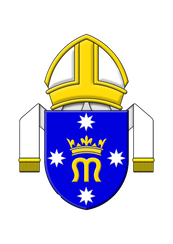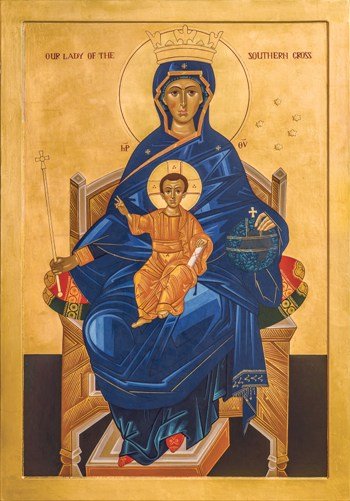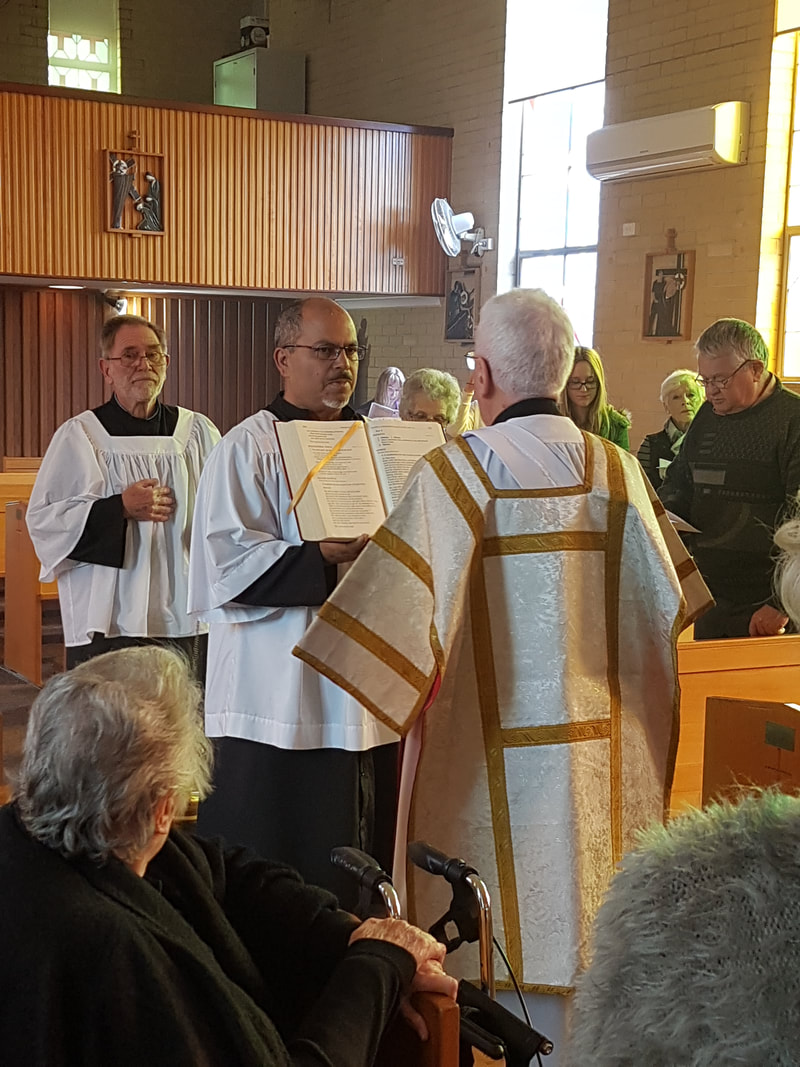Answering your questions about becoming Catholic and taking up Membership in the Personal Ordinariate:
What happens if I am seeking Baptism?
The life-changing moment of Baptism makes us one with God, Father, Son and Holy Spirit, for ever changed and changing from glory to glory. We are baptised into Christ's Death, that we might rise with him into his Resurrected Life. Both children and adults come to be baptised in Christ within the Ordinariate, thus becoming members of the Catholic Church, and also canonical members of the Personal Ordinariate of Our Lady of the Southern Cross.
What if I am already baptised and I am seeking reception into the Catholic Church?
If you are already baptised and feeling called to enter the fulness of Catholic Communion, the Personal Ordinariate is here to help. Reception into the Church involves studying the Catholic Faith with us for a time, so that you can know to what it is you are committing. After making your final decision, there is a ceremony of Reception into the Church, in which you will be welcomed home. When we receive you into the Church, the Sacrament of Confirmation is usually administered at that time.
What if I am Catholic but never received the Sacrament of Confirmation?
In the Sacrament of Confirmation, we are strengthened to do the works appointed for us to do by the Holy Spirit, especially in leading others to Christ. We know that sometimes things happen, circumstances change, and occasionally the baptised miss out on receiving Confirmation. If you, for whatever reason, were baptised Catholic, but were never confirmed in the Catholic Church, the Personal Ordinariate is authorised to administer the Sacrament of Confirmation. What we normally do is take you through a short catechesis on the Sacrament and, if it is needed, some further exploration of the Catechism of the Catholic Church through the Catholic Truth Society's Evangelium resource. The administration of the Sacrament normally takes place during the Sunday Mass. When you receive the Sacrament of Confirmation with us, you can then elect to become a member of the Ordinariate should that be your desire.
Why should I consider the Personal Ordinariate as the means to enter the Catholic Church?
The Personal Ordinariates occupy a unique position within the Catholic Church. We were the first groups from among those ecclesial communities separated from the Catholic Church at the time of the Protestant Reformation to be welcomed back into full communion with the Catholic Church. We understand and empathise with the many aspects and issues that a journey into the Church presents, especially for those who identify as Protestants.
What if I've never been to church before and am completely new to all this?
For those who are new to Christianity, we provide a particular home within the Catholic Church based on a spirituality formed and developed from the Anglo-Celtic traditions of the British Isles and shaped through a very long history, from the Early Church, through the Anglo-Saxon period, through the Norman invasion, and the Middle Ages, the tribulations of the Reformation era, down to our own day. Our path is Bible-focussed, community-oriented, liturgical and personal, and with spiritual direction and ascetical practices from nearly two thousand years of tradition. Our prayer life is focussed on praying together in an ordered and reasoned manner and with decorum and dignity. We highly value every member of our parish family.
What if I am already a baptised and confirmed Catholic, who has received my First Communion? Can I ever become a Member of the Ordinariate?
Initially when the Personal Ordinariates through the Apostolic Constitution Anglicanorum Cœtibus (2009), and its Complementary Norms, he was concerned about those groups of Anglicans asking to be received as communities into the Catholic Church. Since that time, Pope Francis has consistently made the conditions for membership of the Personal Ordinariates wider and wider. He has also given approval to our several liturgical books. Now, our Apostolic Administrator, Bishop Anthony Randazzo, has communicated throughout the Ordinariate that the rules have been further changed to allow for those who regularly worship with us and participate in our community, the opportunity to apply for canonical membership in the Personal Ordinariate of Our Lady of the Southern Cross.
So, if you want to make our patrimony your own, and you want to make your spiritual home with us, then we would welcome your application for canonical membership.
What is Canonical Membership, and how will it affect me?
Canonical Membership is a personal election to transfer your canonical status within the Catholic Church from membership within your local Church (normally your local Catholic Diocese) to the Personal Ordinariate. The Ordinariate is like a diocese, so your canonical status will change so that you are no longer a canonical member of your local diocese in which you are domiciled. In other words, your Ordinary (Bishop) will no longer be the local Bishop or Archbishop where you reside. Your canonical rights, obligations and duties will be transferred to the Ordinariate. If you want to be married, for instance, the paperwork will go through the Ordinariate, not your local parish or diocese.
The life-changing moment of Baptism makes us one with God, Father, Son and Holy Spirit, for ever changed and changing from glory to glory. We are baptised into Christ's Death, that we might rise with him into his Resurrected Life. Both children and adults come to be baptised in Christ within the Ordinariate, thus becoming members of the Catholic Church, and also canonical members of the Personal Ordinariate of Our Lady of the Southern Cross.
What if I am already baptised and I am seeking reception into the Catholic Church?
If you are already baptised and feeling called to enter the fulness of Catholic Communion, the Personal Ordinariate is here to help. Reception into the Church involves studying the Catholic Faith with us for a time, so that you can know to what it is you are committing. After making your final decision, there is a ceremony of Reception into the Church, in which you will be welcomed home. When we receive you into the Church, the Sacrament of Confirmation is usually administered at that time.
What if I am Catholic but never received the Sacrament of Confirmation?
In the Sacrament of Confirmation, we are strengthened to do the works appointed for us to do by the Holy Spirit, especially in leading others to Christ. We know that sometimes things happen, circumstances change, and occasionally the baptised miss out on receiving Confirmation. If you, for whatever reason, were baptised Catholic, but were never confirmed in the Catholic Church, the Personal Ordinariate is authorised to administer the Sacrament of Confirmation. What we normally do is take you through a short catechesis on the Sacrament and, if it is needed, some further exploration of the Catechism of the Catholic Church through the Catholic Truth Society's Evangelium resource. The administration of the Sacrament normally takes place during the Sunday Mass. When you receive the Sacrament of Confirmation with us, you can then elect to become a member of the Ordinariate should that be your desire.
Why should I consider the Personal Ordinariate as the means to enter the Catholic Church?
The Personal Ordinariates occupy a unique position within the Catholic Church. We were the first groups from among those ecclesial communities separated from the Catholic Church at the time of the Protestant Reformation to be welcomed back into full communion with the Catholic Church. We understand and empathise with the many aspects and issues that a journey into the Church presents, especially for those who identify as Protestants.
What if I've never been to church before and am completely new to all this?
For those who are new to Christianity, we provide a particular home within the Catholic Church based on a spirituality formed and developed from the Anglo-Celtic traditions of the British Isles and shaped through a very long history, from the Early Church, through the Anglo-Saxon period, through the Norman invasion, and the Middle Ages, the tribulations of the Reformation era, down to our own day. Our path is Bible-focussed, community-oriented, liturgical and personal, and with spiritual direction and ascetical practices from nearly two thousand years of tradition. Our prayer life is focussed on praying together in an ordered and reasoned manner and with decorum and dignity. We highly value every member of our parish family.
What if I am already a baptised and confirmed Catholic, who has received my First Communion? Can I ever become a Member of the Ordinariate?
Initially when the Personal Ordinariates through the Apostolic Constitution Anglicanorum Cœtibus (2009), and its Complementary Norms, he was concerned about those groups of Anglicans asking to be received as communities into the Catholic Church. Since that time, Pope Francis has consistently made the conditions for membership of the Personal Ordinariates wider and wider. He has also given approval to our several liturgical books. Now, our Apostolic Administrator, Bishop Anthony Randazzo, has communicated throughout the Ordinariate that the rules have been further changed to allow for those who regularly worship with us and participate in our community, the opportunity to apply for canonical membership in the Personal Ordinariate of Our Lady of the Southern Cross.
So, if you want to make our patrimony your own, and you want to make your spiritual home with us, then we would welcome your application for canonical membership.
What is Canonical Membership, and how will it affect me?
Canonical Membership is a personal election to transfer your canonical status within the Catholic Church from membership within your local Church (normally your local Catholic Diocese) to the Personal Ordinariate. The Ordinariate is like a diocese, so your canonical status will change so that you are no longer a canonical member of your local diocese in which you are domiciled. In other words, your Ordinary (Bishop) will no longer be the local Bishop or Archbishop where you reside. Your canonical rights, obligations and duties will be transferred to the Ordinariate. If you want to be married, for instance, the paperwork will go through the Ordinariate, not your local parish or diocese.


